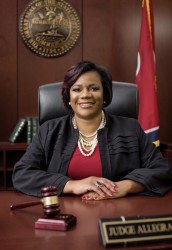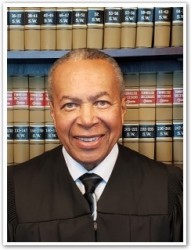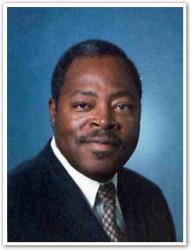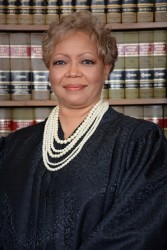All judges have stories to tell about the people, places, and experiences that helped them get where they are. Given the level of ability and achievement that it takes to reach the bench, those stories often share common ingredients that are predictors of success: a robust work ethic, strong mentors, a solid educational foundation.
For many of Tennessee’s judges of color, historically Black colleges and universities were the places where they were able to gain the confidence and knowledge necessary to begin their careers. Whether they attended an HBCU by necessity, by choice, or in continuation of a rich family legacy, these Tennessee judges all feel that they gained something from attending an HBCU that they could not have attained elsewhere.
When 20th Judicial District Criminal Court Judge Monte Watkins graduated from high school in Memphis in 1965, his choices were limited both due to financial reasons and because of the racial climate of the time.
“That was an era when African Americans were not necessarily welcome at many of the major universities,” Judge Watkins said.
Judge Watkins applied to several different schools and actually received a scholarship to Alabama State University, but he was not eager to go live in the Deep South in that time of heightened racist violence, so decided to stick closer to home.
“Tennessee State University was the most reasonable option,” he said. “I couldn’t really even afford it, but I went anyway.”
The supportive environment he found there surpassed his expectations.
“I got the world out of it,” Judge Watkins said. “It was an environment that felt like a family. I didn’t feel intimidated. I didn’t’ feel like an outsider. It was very inclusive. It was a whole new world that was opened up to me, from sports, to cultural events, to mixing and mingling with students from all over the country and some students from different parts of the world. It was just a very nurturing environment that I absolutely loved. I just loved it.”
This experience was at odds with that of some of his friends who attended predominately white institutions (PWIs). Those friends told him of feeling isolated and intimidated at school, instead of feeling like they were part of a close-knit campus community.
Judge Watkins enjoyed his time at TSU so much that he decided to attend an HBCU for law school as well. He entered North Carolina Central University with a sense of academic confidence. He detected that confidence as well in other first-year students who had also attended HBCUs as undergraduates. Conversely, he noticed that minority students who had attended a PWI at first seemed less likely to assert themselves or speak up in class.
Judge Watkins’ time at TSU and North Carolina Central proved advantageous not just while he was a student, but also in his subsequent career as a judge. The person he is today was shaped by his HBCU background.
“Having that HBCU experience, I’ve never been intimidated or inhibited or been afraid to assert myself and I think that’s helped me throughout my career and helped me being a judge and doing whatever I’ve done,” Judge Watkins said.
Court of Appeals Judge John Westley McClarty attended Austin Peay University as an undergraduate before moving to an HBCU for law school.
Judge McClarty graduated from Austin Peay in 1971. Although not an HBCU, Austin Peay back then only had about 25 black students in total, Judge McClarty remembers. While he values the education he received at Austin Peay, he said that he and his fellow African American students did not always face a supportive environment.
“There was a level of uncomfortableness,” he recalled. “It was only after we were there for a while when we were able to develop a sense of being comfortable because the atmosphere was not conducive to support us at that time. The administration was pushing to get Black students there and to educate Black students, but a lot of people that were there were not openly accepting of that idea.”
After his undergraduate work, Judge McClarty was drafted into the United States Army for two years. When he finished his service and applied to law schools, he found most unreceptive.
“The white law schools that I applied to basically weren’t admitting Black students then,” he said.
This was 1973, less than 50 years ago. African Americans in the legal profession were scarce, especially in Chattanooga and East Tennessee, where Judge McClarty grew up. From an early age, Judge McClarty always harbored an ambition to become a lawyer, but he is not sure where that ambition came from because Chattanooga was all but bereft of Black leaders in the legal sphere. He said there were no African American attorneys in the city until he was in the 7th or 8th grade, and then only one.
“There were no role models for me to follow in Chattanooga, but for some reason or another, I always had this desire in my heart as a kid,” Judge McClarty said.
Surveying his inauspicious prospects at majority law schools, Judge McClarty applied and was accepted to Southern University Law Center in Baton Rouge, Louisiana.
Unlike at Austin Peay, Judge McClarty was comfortable right away in law school. He got the feeling that everyone who worked at the university was committed to his success. As a result, he was able to simply buckle down and focus on his studies rather than negotiate a challenging environment. This was true even though the school lacked some of the resources that PWI schools may have enjoyed.
“The administration and the faculty went overboard to make sure that we had everything that we needed,” he said. “You must understand during those days the HBCUs were not getting all the financial assistance that they needed. In some areas they had shortcomings. The administration and the professors were a dedicated people, though, and encouraged us to use everything they were giving us to develop ourselves and achieve what we were trying to achieve.”
Judge McClarty earned his Juris Doctor in 1976, well-versed in the law but still something of an anomaly in his home region of the state.
“When I started practicing law in 1976 there was only one other Black lawyer in East Tennessee at the time,” he said.
When he was appointed to the Court of Appeals in 2009, after more than 30 years of trying cases, he had never argued before an African American state judge in East Tennessee. Judge McClarty himself would become the first African American state judge from East Tennessee when he was appointed to the bench.
He said it is very possible that none of it would have happened if not for Southern University.
“Without Southern University there’s a question as to whether I would have been able to get into law school and complete my legal training,” he said. “So I’m thankful for them.”
Judge Watkins’ and Judge McClarty’s experiences point to an essential historical fact about HBCUs: they were born out of inequality.
Education was rare for African Americans north of the Mason-Dixon Line in the pre-Civil War United States and forbidden south of it. The country’s first HBCU, Cheyney University, was founded by a Quaker philanthropist in Pennsylvania in 1837. A handful of other institutions, including Lincoln University in Pennsylvania, and Wilberforce University in Ohio—the first HBCU to be owned and operated by African Americans—followed in the 1850s. Most HBCUs, however, were not started until after the Civil War, when the yoke of the Confederacy had been broken.
In 1865, Shaw University became the first HBCU to be established in the South, opening in North Carolina just after the war ended. In 1866, Fisk University was founded in Nashville, while 1867 saw the establishment of seven schools, including two that are to this day among the most prestigious HBCUs: Howard University and Morehouse College. The Second Morrill Act of 1890 mandated that states that received federal funding for higher education could not discriminate on the basis of race in admissions, unless they agreed to establish separate institutions for minority students. This led directly to the creation of 17 public land grant HBCUs, nearly all of them in the South. Tennessee State University and Tuskegee University were two such HBCUs founded as a result of this act.
In the decades that followed, these and many other HBCUs performed the essential service of providing quality educations to Black citizens whose aspirations for self-improvement would otherwise have been obviated by Jim Crow and racial animosity. Despite operating at a decided economic disadvantage compared to majority white institutions, many of these HBCUs persevered, populating various fields with Black professionals and edifying a nation that too often dismissed African American achievement through the example of iconic HBCU graduates like Booker T. Washington, W.E.B. Du Bois, Martin Luther King, Jr., and countless others.
According to the U.S. Department of Education, the term “historically black college or university” dates back to the passage of the Higher Education Act of 1965, which defined an HBCU as “any historically black college or university that was established prior to 1964, whose principal mission was, and is, the education of black Americans, and that is accredited by a nationally recognized accrediting agency or association determined by the Secretary [of Education] to be a reliable authority as to the quality of training offered or is, according to such an agency or association, making reasonable progress toward accreditation.”
In 2018, there were 101 HBCUs in the country (including the District of Columbia and the U.S. Virgin Islands), making up less than 3 percent of America’s institutions of higher learning. These schools’ impact, though, is far greater than that number would suggest. For instance, 24 percent of African Americans who graduate with degrees in STEM fields do so from HBCUs. The schools are responsible for 22 percent of all degrees earned by African Americans. According to the United Negro College Fund (UNCF), 70 percent of Black doctors and dentists, 50 percent of Black engineers, and 35 percent of Black lawyers have a degree from an HBCU.
HBCU grads are prominent in Tennessee’s legal sphere, as well, with nearly half of the state’s African American judges having earned either an undergraduate or law degree from an HBCU. Historically, some of the state’s most notable legal luminaries were HBCU graduates. For example, famed Civil Rights attorney Z. Alexander Looby was a Howard University graduate as was former Tennessee Supreme Court Chief Justice Adolpho A. Birch, Jr., the first African American to serve in that role.
As the country has changed in recent decades so too have HBCUs. For one thing, HBCUs have higher percentages of non-African American students than they once did. Nationally in 2018, 24 percent of students at HBCUs are non-African American, as compared to 15 percent in 1976, according to a report by the National Center for Education Statistics.
Many things, though, have stayed the same. For instance, HBCUs are still reaching students that many PWIs do not. According to the Thurgood Marshall College Fund, 52 percent of HBCU attendees are first-generation college students. As the UNCF reports, around 70 percent are low-income students who qualify for Pell Grants and 80 percent receive federal loans. Furthermore, HBCU graduates today report that their institutions provided them with a superior experience. As Black Enterprise reported in 2015, a Gallup-Purdue University survey found that African American HBCU graduates had a higher sense of well-being than non-HBCU grads in five crucial areas: purpose, social, financial, community, and physical.
Unlike Judge Watkins and Judge McClarty, Shelby County General Sessions Judge Loyce Lambert Ryan had more choices when she was deciding where to go to college in 1976. While her options were limited for financial reasons, she did apply to several schools, including PWIs like the University of Tennessee.
In the end, though, Judge Lambert Ryan decided on Clark College (since consolidated into Clark-Atlanta University) in Atlanta for several reasons. First, she wanted to leave her hometown of Memphis, but not go too far away. Second, she liked the idea of a smaller school with a community feel that was nonetheless in a larger metropolitan setting. Lastly, and most importantly, Judge Lambert Ryan was interested in pursuing a career in broadcasting and filmmaking, and Clark had a strong mass communications program.
Once she reached Clark, Judge Lambert Ryan soon found that she had made the right choice. The school provided numerous opportunities for her to explore her interests, while at the same time surrounding her with endlessly helpful faculty members who seemed genuinely concerned with making sure that she got the most out of her college experience.
“It’s almost hard for me to put in words, but when you’re 18 years old and you have a dream, having someone help you work through your goals, give you opportunities, ask ‘Did you look at this? Have you thought about this?’ It was nurturing,” she said. “I had a radio show. I made movies. I did photography. Possibly I could have done those things at other places, but the easy access, the little extra push and shove…They made you feel special. They looked at the good you had to offer and nurtured it.”
That supportive environment gave her additional confidence to follow her passions. Of course, not everything always goes according to plan. Judge Lambert Ryan said that the stupendous talents of another student in her film class made her realize that her future may lie in a different field.
“I went to school with Spike Lee,” she said. “He was at Morehouse College, but took film classes at Clark. He was the reason I didn’t go into film.”
Instead, she focused on broadcasting and majored in broadcast management. She had intentions of going on to graduate school, when a professor in her Radio 2 class made a suggestion.
“He said, ‘You know you like to argue. You need to think about going to law school,’” Judge Lambert Ryan remembered. “I was like, ‘Law school?’ And he says, ‘Yeah, law school. You remind me of my niece, and she’s at law school at Howard. Let me know if that’s what you want to do, and I’ll help you.’”
She thought about it and decided that her professor might be right. He wrote her a strong letter of recommendation and before long she was putting the writing and speaking skills she developed in broadcasting to use at the University of Iowa College of Law, from which she graduated in 1983.
Judge Lambert Ryan’s daughter followed in her mother’s footsteps and now attends Clark-Atlanta University, where she is majoring in biology.
The multi-generational appeal of HBCUs is definitely no secret to Davidson County General Sessions Judge Allegra Walker.
Judge Walker grew up in Langston, Oklahoma, the home of Langston University, an HBCU founded in 1897 as a public land-grant school. Both of Judge Walker’s parents were HBCU graduates who worked at Langston. Her mother was a psychology professor, while her father taught music and eventually became Vice President of Academic Affairs.
In all, Judge Walker counts 15 uncles, aunts, and cousins who attended HBCUs.
When it came time for her to decide where she wanted to go to college, she knew that she wanted to go somewhere outside of Oklahoma and she knew that she wanted to attend an HBCU.
“It was in my blood, to be honest,” she said. “It’s all I knew. It’s all that was promoted throughout my family. I saw where the HBCU model had been successful with my family, as well as with students who came through Langston.”
Judge Walker especially appreciated how HBCUs acted in effect like extended families for their students.
“You always saw, it was about family,” she said. “Everybody looked out for each other. If you needed something, someone was there to help you out. I would see students who came from impoverished environments, and a professor would take them under their wing and help them out. I remember, even as a senior in high school, a young lady could not afford to live in a dorm and she lived with us for a semester.”
Judge Walker found the same community spirit in full force at Fisk University, where she enrolled after high school. Teachers and administrators were enthusiastic about helping out those in need.
At Fisk, Judge Walker felt a connection not only to her fellow students and faculty members, but to a wider story of African American and African perspectives and culture that was emphasized by the school.
That sense is tightly connected to a respect for the long line of historic figures who have studied at Fisk. It was inspiring for Judge Walker to ponder how she was following in a tradition that included former Fisk students like W.E.B. Du Bois, Ida B. Wells, Nikki Giovanni, and John Lewis.
“You just have that pride about yourself and where you come from,” she said. “This small institution that sometimes struggles financially has had a profound academic and social impact. It has made me into the kind of person I am today.”
One of Judge Walker’s favorite parts of her HBCU experience has to do with networking. She said that Fisk alumni are a welcoming bunch, always happy to meet another member of their group.
“I can go to my alumni directory and literally, I promise you, I can say, ‘I’m going to Timbuktu this weekend and I would like to connect with a Fiskite’,” she said. “I can go to that directory, find probably five Fiskites, and call them.”
Likewise, when she attends homecoming events or reunions at Fisk, she is always struck by how closely everyone is able to relate to one another.
“I can be among Fiskites who are 20 years older than me, or 20 years younger than me, and it’s all family,” she said. “We’re coming in. We’re having fun. We’re networking. We’re hearing stories. We just do all kinds of things, and it’s family.”
That networking has occasionally come in handy professionally as well. When she was running for office as a judge in Nashville, she knew she had a built-in base of support from Fisk alumni in the area. She was able to reach out to them and let them know that she was seeking a judicial position. She held a Fiskites for Walker event and found that many local Fiskites were eager to support her throughout the election process.
“That’s the power of the HBCU that I don’t know if you get other places,” she said.
The last couple of years seem to have shone a spotlight on HBCUs nationwide. Indeed, Forbes declared 2020 to be “the year of the HBCU.” They attributed this heightened awareness to several factors, including the fact that the nation’s first African American and woman vice president, Kamala Harris, is an HBCU alum; an explosion of private and corporate giving; and the attention paid to the importance of HBCUs during the recent election season.
The increase in major donations to HBCUs is especially significant since, according to the Associated Press, the median endowments of HBCU’s are roughly half the amount of similarly-sized PWIs. The giving is continuing into this new year as well. For instance, FedEx, based in Memphis, recently announced that it is committing $5 million to four HBCUs in Tennessee and Mississippi: TSU, Jackson State University, Mississippi Valley State University, and LeMoyne-Owen College.
Those donations will be important to maintain institutions that, as a UNCF-commissioned study found, collectively generate a $14.8 billion impact for their local and regional economies.
As important as economics are, though, the mission, purpose, and experiences offered by HBCUs are the driving forces that keep inspiring generations of Americans to seek a better future for themselves through higher education. Thriving HBCUs mean more doctors, more lawyers, more engineers, more judges, and fewer lives lapsing into poverty.
“It’s not that African Americans are just now seeing the value of HBCUs, society is seeing the value,” Judge Lambert Ryan said.




